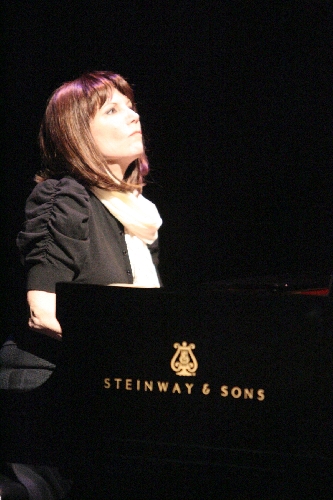Pianist shares mother’s story of Holocaust survival
"She was my piano teacher, but the lessons were really life lessons."
That's how concert pianist Mona Golabek describes her mother, Lisa Jura - the title character of Golabek's acclaimed one-woman show, "The Pianist of Willesden Lane."
After a five-month world premiere run at Los Angeles' Geffen Playhouse, Golabek brings "The Pianist of Willesden Lane" to the Suncoast showroom this weekend before a national tour.
Presented in Las Vegas by Jewish Repertory Theatre of Nevada, "The Pianist of Willesden Lane" focuses on Jura's experiences as a young musical prodigy in 1938 Vienna.
Her musical talents prompted her parents to send her, rather than one of her two sisters, to London via the Kindertransport, a program that saved almost 10,000 children (7,500 of them Jewish) from Nazi-occupied Europe between December 1938 and Sept. 1, 1939, when Nazi Germany invaded Poland and triggered the start of World War II.
During piano lessons with her mother, Golabek would be working on a Beethoven sonata when Jura would interrupt, asking her daughter, " 'Did I ever tell you the story of when Johnny King Kong would read poetry to me?' " Or when " 'Aaron whistled the Grieg piano concerto?' "
Those experiences took place on London's Willesden Lane, in a hostel for Jewish refugee children, where Jura would "hold on to the piano and play the Grieg piano concerto" while the Nazis bombed Britain's capital city.
Throughout, Jura remembered her own mother's parting words to her, when they said goodbye in Vienna: "Hold on to your music - it will be your best friend in life."
Convinced her mother's experiences represented "a fantastic coming-of-age story," Golabek collaborated with Lee Cohen on the book "The Children of Willesden Lane," subtitled "Beyond the Kindertransport: A Memoir of Music, Love and Survival."
After the book's publication, Golabek presented mini-performances for audiences, complete with musical interludes inspired by the book.
"The reaction was so powerful, with the telling of the story through music," Golabek says in a telephone interview. "People would hear 'Claire de Lune' or the 'Moonlight Sonata,' " and ponder how the sound of Jura's chords battled the sound of the bombs overhead.
"It's such a universal story," Golabek acknowledges, citing how "audiences from all walks of life respond to the universal story of holding on" despite the most daunting circumstances.
Golabek also created the Hold on to Your Music Foundation to explore "the power of the arts, especially music, to embolden the human spirit in the face of adversity" - and share that power with students and teachers.
Bringing her mother's story to the stage was "a natural transition for me," says Golabek, who's "always been comfortable being a storyteller," thanks in part to her syndicated radio program "The Romantic Hours."
The challenge in "The Pianist of Willesden Lane," in Golabek's view, was to capture the play's 10 different characters, accents and all.
After a musical career, "it was a whole new art form for me," she says. "But I kind of grew into it. I feel thrilled to be out there," sharing "such an inspiring story ... the story of my amazing mother."
Contact reporter Carol Cling at ccling@reviewjournal.com or 702-383-0272.
Preview
"The Pianist of Willesden Lane"
8 p.m. Saturday, 2 and 7 p.m. Sunday
Suncoast, 9090 Alta Drive
$28-$38 (636-7075)















